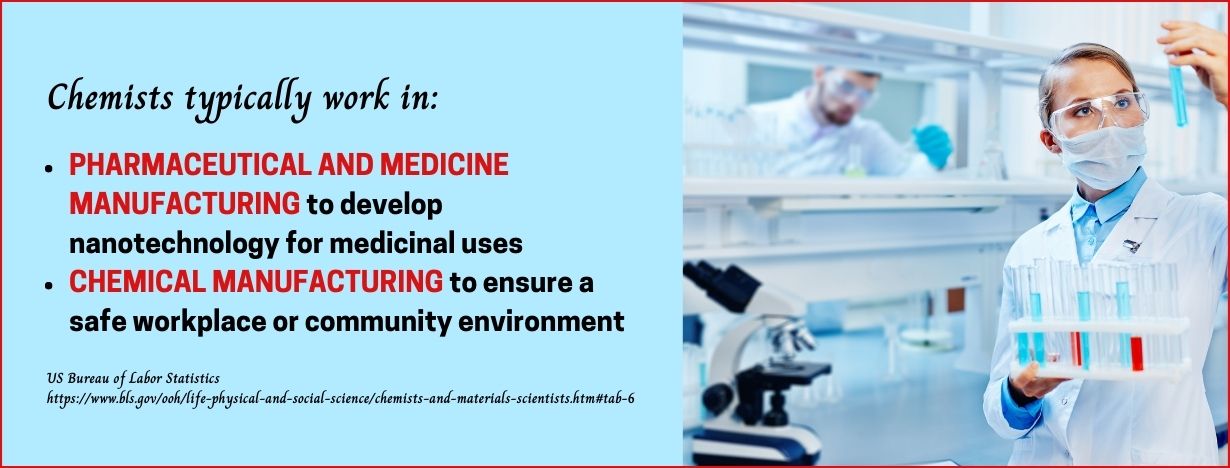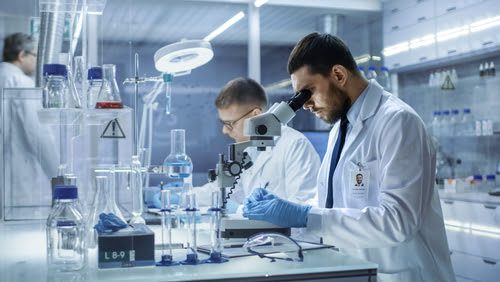Doctor of Chemistry (D.Chem.) Degree Programs provide advanced-level education in Chemistry for students wishing to pursue careers as research scientists, professors, and/or industry professionals.
Students enrolled in D.Chem. programs explore research topics such as green chemistry, advanced biochemistry, and physical chemistry through advanced lab techniques and case studies.
The challenging path to earning a Doctorate of Chemistry degree demands hours of laboratory work and classroom lectures–and all these render distance learning unfeasible. The traditional educational setup ensures quality education for future research scientists.
If the fees related to accommodation and living expenses make you rethink pursuing this career, worry not because almost all institutions offer scholarships to worthy applicants.

The Doctor of Chemistry (D. Chem) is a rare title awarded by some universities. The most popular degree is “Doctor of Philosophy in Chemistry (Ph.D. Chem.)”. The academic degree “Doctor of Science in Chemistry (D.Sci. Chem.)” is also another equivalent title.
10 Best Doctor of Chemistry (D.Chem.) Degree Programs
UNIVERSITY OF OREGON

DOCTORAL PROGRAM IN CHEMISTRY
School Highlights:
The University of Oregon allows Doctor of Chemistry students to engage in research, not just in chemistry but across a diverse breadth of disciplines.
The doctoral program encourages collaboration with researchers from other fields that’s why it offers various interdepartmental opportunities to work on.
Choose from a selection of concentrations that outline the Department of Chemistry and Biochemistry’s commitment to the discipline. Throughout your program, you’ll be exposed to research rotations, teaching opportunities, and lab work. Chemistry tutors can provide personalized guidance and support to help you excel in your studies and achieve your academic goals.
The University of Oregon maintains a state-of-the-art science complex with high-tech laboratory equipment, which are available to doctoral students and their independent pursuits. The entire school provides a collaborative and supportive atmosphere that nurtures skills in leadership and innovation.
Additionally, the curriculum offers internships to expose its Ph.D. students in different industries environments and private sectors. Graduates go on to pursue successful careers in various institutions including government agencies, research facilities, and academic institutions.
Concentration Options:
- Biochemistry
- Molecular Biology and Biophysical Chemistry
- Organic-Inorganic Chemistry
- Physical Chemistry
Campus Location: Eugene, OR
Accreditation:
- Northwest Commission on Colleges and Universities
8060 165th Avenue NE, Suite 200
Redmond, Washington 98052
www.nwccu.org, (205) 525-9848
Did You Know?
The University of Oregon is situated in Eugene, Oregon, which is surrounded by a view of the mountains and the coast. This allows the students to participate in different outdoor programs like biking, adventure trips, and river rafting. You’ll also get the chance to join environmental activities like trail restorations and clean-ups.
LEARN MORE ABOUT THE UNIVERSITY OF OREGON’S DOCTORAL PROGRAM IN CHEMISTRY
MICHIGAN STATE UNIVERSITY

CHEMISTRY, PH.D.
School Highlights: Michigan State University houses a well-funded Department of Chemistry that offers one of the most dynamic Chemistry Ph.D. programs in the country.
The curriculum includes a wide range of topics in Chemistry, imparting foundational knowledge while introducing new scientific concepts and research applications.
You’ll be dealing with courses in analytical, organic, and physical chemistry. Plus, work on interdisciplinary topics such as spectroscopy, polymers, and material science.
The Chemistry Building is home to an incredibly impressive array of research equipment and laboratories, such as the Superconducting Cyclotron Laboratory and the Shard Laser Facility. The university grants over $9 million for research funding which makes this program even more attractive.
Financial opportunities at MSU are also abundant, offering different grants, scholarships, fellowships, and assistantships. Doctoral students work closely with their expert faculty members and produce outstanding research findings that are often printed in major scientific publications.
Concentration Options:
- Analytical Chemistry
- Biological Chemistry
- Chemical Physics
- Inorganic Chemistry
- Nuclear Chemistry
- Organic Chemistry
- Physical Chemistry
- Theoretical and Computational Chemistry
Campus Location: East Lansing, MI
Accreditation:
- Higher Learning Commission
230 South LaSalle Street, Suite 7-500
Chicago, Illinois 60604
www.hlcommission.com, (800) 621-7440
Did You Know?
Michigan State University has garnered a lot of recognition since its establishment in 1855. Throughout the years, the university has perfected its graduate programs which have landed on top of different academic rankings. MSU currently ranks number one for graduate programs in Nuclear Physics, Secondary Education, and Rehabilitation Counseling according to the U.S. News and World Report.
LEARN MORE ABOUT MICHIGAN STATE UNIVERSITY’S CHEMISTRY, PH.D.
UNIVERSITY OF HOUSTON

CHEMISTRY, PH.D.
School Highlights:
At the University of Houston, students taking up a doctoral degree in chemistry will get the chance to explore different areas of chemistry while improving their research and analytical skills.
Be mentored by competent and internationally recognized faculty members who encourage interdisciplinary research and collaboration. You’ll also get the chance to assist them during intensive research projects, which offer an astoundingly rich academic experience.
Located in a hub for scientific and entrepreneurial opportunities, the campus provides opportunities to connect to global corporations and national laboratories throughout Houston.
During admission, students must choose a division that best aligns with their academic standing and career goals. Division options include Organic, Inorganic, and Physical Chemistry. Each division comprises 18 credit hours but differs in core courses and electives.
Additionally, you’ll be required to participate in seminars and finish a Ph.D. dissertation to earn your degree. After graduation, you’ll be qualified to hold high-level positions of employment in government and industry labs and even pursue a teaching career in prestigious universities.
Coursework Sample:
- Thermodynamics and Kinetics
- Physical Inorganic Chemistry
- Quantum Chemistry
- Molecular Spectroscopy
- Organometallic Chemistry
Campus Location: Houston, TX
Accreditation:
- Southern Association of Colleges and Schools Commission on Colleges (SACSCOC)
Did You Know?
The University of Houston offers different on-campus facilities to make your student life more interesting. If you’re into sports, the Fertitta Center and TDECU Stadium are great venues to watch a match and support the Houston Cougars. Aside from a selection of restaurants, enjoy a stroll in the Lynn Eusan Park or enrich your creative side in the Blaffer Art Museum.
LEARN MORE ABOUT THE UNIVERSITY OF HOUSTON’S CHEMISTRY, PH.D.
UNIVERSITY OF CALIFORNIA, BERKELEY

CHEMISTRY PH.D. PROGRAM
School Highlights: The Chemistry Ph.D. program at UC Berkeley emphasizes on improving its enrollees’ research skills, driving them to explore creative and innovative means. The curriculum comprises of minimal course requirements since the program is geared towards research and independent study.
You’ll have three concentration options:
- Physical Chemistry,
- Chemical Biology,
- and Synthetic Chemistry.
Although each one has a specific set of degree requirements, you’ll be able to create your own innovative and far-reaching chemistry projects. For example, those in the Physical Chemistry concentration may explore areas in analytical, biochemical, and nuclear chemistry.
The independent research project is the most essential part of the entire degree, aside from the teaching component. The Department of Chemistry requires all doctoral students to assist in an instructional program during the first three years of their residency. A
dditionally, stay updated with the latest research on chemistry and other areas in the scientific community by attending weekly seminars. You may also join small group discussions that encourage peer review and collaboration, The cumulative experiences at Berkeley are invaluable and will surely prepare you for high-level employment in the industry.
Coursework Sample:
- Quantum Mechanics
- Interactions of Radiation with Matter
- Statistical Mechanics
- Group Theory
Campus Location: Berkeley, CA
Accreditation:
- Western Association of Schools and Colleges
533 Airport Boulevard, Suite 200
Burlingame, CA 94010
www.acswasc.org, (650) 696-1060
Did You Know?
University Of California, Berkeley ensures that its students receive the best career options by providing different career services. Its Career Center offers different events and workshops to guide graduating individuals towards the professional world. Some activities include Career Fairs, Coaching, and Information Sessions.
LEARN MORE ABOUT THE UNIVERSITY OF CALIFORNIA, BERKELEY’S CHEMISTRY PH.D. PROGRAM
UNIVERSITY OF MISSISSIPPI

DOCTOR OF PHILOSOPHY IN CHEMISTRY
School Highlights:
The University of Mississippi’s Department of Chemistry and Biochemistry offers some of the most sought-after programs in the field, including the Doctor of Philosophy Program in Chemistry. This 54-credit degree comprises of courses from the available concentrations including:
- Biochemistry,
- Organic,
- and Physical Chemistry.
It provides an in-depth learning experience and is designed to enhance your understanding of all of the traditional areas of the profession. To graduate, you’ll need to take four cumulative examinations, an oral examination, and a dissertation presentation and defense.
The University of Mississippi has strong ties to national agencies and labs such as NASA, the American Chemical Society, and the National Institute of Justice. Students often complete research projects in collaboration with these industries and expand their network in the process.
The program is perfect for Chemists seeking a career in education, working as an instructor or school labs, or government agencies that handle research and development. You may also pursue a career in the industrial industry and specialize in different chemistry vocations.
Coursework Sample:
- Advanced Instrumental Analysis
- Physical Biochemistry
- Advanced Organic Chemistry
- Chemical Applications of Group Theory
- Chemical Thermodynamics
Campus Location: Oxford, MS
Accreditation:
- Southern Association of Colleges and Schools Commission on Colleges (SACSCOC)
Did You Know?
The University of Mississippi is part of the R1: Doctoral Universities – Very High Research Activity list, which comprises of research universities classified through the Carnegie Classification of Institutions of Higher Education. Being part of this tier means that the institution produces many research resources and conducts the most research activities.
LEARN MORE ABOUT THE UNIVERSITY OF MISSISSIPPI’S DOCTOR OF PHILOSOPHY IN CHEMISTRY
FLORIDA INSTITUTE OF TECHNOLOGY

PH.D. IN CHEMISTRY
School Highlights: The Florida Institute of Technology prides itself on an incredibly diverse chemistry education environment. The Chemistry Ph.D. program is a combination of one-on-one mentorship, internships, and assistantships to maximize your learning potential.
Learn from some of the country’s most seasoned instructors and gain insights into different fields like Biotechnology, Disease Pathology, and Nanomaterials. Plus, work with other Chemists and expand your network through collaborative research projects and fieldwork.
Past projects have spanned a vast array of topics, such as degenerative disease approaches, DNA analysis, and chromosome replication.
Another reason to choose Floride Tech is its modern research facilities and laboratories. The F.W. Olin Physical Sciences Center is a 70,000 square foot research center that comprises different facilities that deal with research, microscopy, and photochemistry.
Additionally, Florida Tech has strong ties with the Harbor Branch Oceanographic Institute and Kennedy Space Center, which provides incredible opportunities for doctoral students.
Graduates will enter the industry with the needed skills and expertise to effect massive change in different industries including manufacturing, health, and alternative energy.
Coursework Sample:
- Interpretation of Chemical Spectra
- Organic Synthesis
- Natural Products
Campus Location: Melbourne, FL
Accreditation:
- Southern Association of Colleges and Schools Commission on Colleges (SACSCOC)
Did You Know?
Florida Institute of Technology prides itself in having a 92% employment rate after graduation. This shows the school produces capable graduates who are qualified to take on different roles and positions. Plus, most of the graduates receive a good paycheck, with some earning an average of $56,000 years after graduation.
LEARN MORE ABOUT FLORIDA TECH’S PH.D. IN CHEMISTRY
JOHNS HOPKINS UNIVERSITY

PH.D. DEGREE IN CHEMISTRY
School Highlights: The Chemistry Ph. D. degree program at Johns Hopkins University aims to align with its student’s academic backgrounds and professional goals. That’s why the program is comprised of different courses that will give you a broad understanding of different scientific concepts and research studies.
With this program, you’ll be hitting two birds with one stone as It allows you to earn both a master’s and Ph.D. in one curriculum. On top of the core courses, you’ll also be able to participate in a series of departmental seminars to further your technical expertise.
Towards the end of your program, you’ll also be required to do a thesis dissertation that aims to challenge you to think critically and independently. As a future frontrunner in the discipline, get the needed hands-on experience participating in a one-year teaching assistantship.
Additionally, the Department of Chemistry has different student organizations to help you expand your network and improve your extra-curricular experience. Ultimately, John Hopkins is a known institution for providing high-caliber graduates, so you can definitely look forward to a great career ahead of you!
Coursework Sample:
- Organometallic Chemistry
- Chemistry of Inorganic Compounds
- Spectroscopy
- Statistical Mechanics
- Chemical Biology
Campus Location: Baltimore, MD
Accreditation:
- Middle States Commission on Higher Education
3624 Market Street, Suite 2 West
Philadelphia, PA 19104
www.msche.org, (267) 284-5000
Did You Know?
John Hopkins University’s Krieger School of Arts and Sciences offers a range of undergraduate and graduate programs, with over 60 majors and minors. The majority of its students participate in research, contributing to over 50 laboratories and institutes. Plus it has been receiving one of the largest research funding budgets for over four decades.
LEARN MORE ABOUT JOHNS HOPKINS UNIVERSITY’S PH.D. DEGREE IN CHEMISTRY
STANFORD UNIVERSITY

PH.D. IN CHEMISTRY
School Highlights: Stanford University is a well-respected academic institution offering a variety of programs ranging from undergraduate to doctorate ones. Its Ph.D. program in Chemistry is one to look out for. Stanford’s curriculum dives deep, going beyond the basic topics in chemistry.
You’ll be covering sub-disciplines like human health, biotechnology, and catalysis. You can choose from different majors including:
- chemical physics,
- inorganic chemistry,
- and biophysical chemistry.
Aside from the prescribed graduate-level courses, you may take units from related fields such as chemical engineering and materials science.
You’ll also be exposed to a lot of data gathering and research work through a dissertation. Get the chance to work on testing new theories and developing new models on a molecular level. You’ll be mentored by top-notch instructors in the industry.
What’s more, you’ll receive academic advising so you’ll be properly guided during your research studies and dissertation. Get the guidance you need toward a successful career path in Chemistry. By developing a better understanding of the industry, you may pursue positions in both private and public institutions.
Coursework Sample: Stanford, CA
- Advanced Physical Chemistry
- Research and Special Advanced Work
- Biophysical Chemistry
- Chemical Principles
- Bio-inorganic Chemistry
Campus Location:
Accreditation:
- Western Association of Schools and Colleges Senior College and University Commission (WSCUC)
Did You Know?
Stanford University’s Department of Chemistry was one of the first few departments opened during its establishment in 1891. The department has since then been offering quality programs and has recently opened an interdisciplinary institute where Chemistry majors can collaborate with Engineering and Medical students. Chem-H hopes to spark advancement through research and forward-thinking.
LEARN MORE ABOUT STANDFORD UNIVERSITY’S PH.D. PROGRAM IN CHEMISTRY
UNIVERSITY OF AKRON

PH.D. IN CHEMISTRY
School Highlights:
Students attending the University of Akron’s Doctor of Philosophy in Chemistry degree will be exposed to interdisciplinary education, covering different approaches in Chemistry and even touching topics in Biology and Physics. You’ll also get the chance to further improve your research and communication skills, which are vital in succeeding in the industry.
Learn from tenured faculty and conduct experiments in high-quality facilities such as the Mass Spectrometry Center and the Center for Laster & Optical Spectroscopy. Learn from excellent instructors and gain access to a selection of academic resources.
In terms of admissions, UA accepts students with a Master’s in Chemistry or any related field. On top of that, you’ll also need to submit recommendation letters and a statement of purpose to be admitted successfully. Students with good academic standing may have the chance to receive financial assistance.
The school also offers free tuition by participating in teaching or research assistantships for the academic year and summer. Well-seasoned graduates of Akron refine their skills as researchers, laboratory managers, and educators in chemistry.
Coursework Sample:
- Thermodynamics & Statistical Thermodynamics
- X-Ray Crystallography
- Enzymatic Reactions
Campus Location: Akron, OH
Accreditation:
- Higher Learning Commission of the North Central Association
Did You Know?
The University of Akron got its name from the hilltop area which means the “highest point”. This name fits the university since it offers high-quality academic programs which attract over 10,000 enrollees every year. Some popular programs include Nursing, Marketing Management, and Psychology.
LEARN MORE ABOUT THE UNIVERSITY OF AKRON’S PH.D. IN CHEMISTRY.
MASSACHUSETTS INSTITUTE OF TECHNOLOGY

PH.D. IN CHEMISTRY
School Highlights: The Massachusetts Institute of Technology aims to produce outstanding leaders from different fields like science, engineering, and mathematics. In the same manner, MIT’s Chemistry Department aims to produce excellent graduates that can positively contribute to the industry.
The Ph.D. program offers both flexibility by letting you choose courses that you’re interested to take, and hands-on experience through a two-semester teaching assistant opportunity. In your first year, you’ll be given the chance to handle laboratory classes.
Aside from taking graduate-level courses, you’ll also be taking oral and written examinations, as well as working on postdoctoral research. Throughout your program, you’ll be guided by a thesis adviser to help you progress with your research. Additionally, the program involves desk rotations so you can connect with senior Ph.D. students while working on your coursework.
The department values networking and embracing advocacies. That’s why it’s home to several student organizations such as Women+ in Chemistry and Chemistry Alliance for Diversity and inclusion.
Coursework Sample:
- Synthetic Organic Chemistry
- Principles of Organometallic Chemistry
- Laboratory Chemistry
- Heterocyclic Chemistry
- Introductory Quantum Mechanics
Campus Location: Cambridge, MA
Accreditation:
- New England Commission of Higher Education (NECHE)
Did You Know?
Massachusetts Institute of Technology was incorporated in 1861 and has been following a Latin motto, “mens et manus” which translates to “mind and hand”. This is a reflection of MIT’s educational style that involves practical applications, going beyond theoretical knowledge.
LEARN MORE ABOUT THE MASSACHUSETTS INSTITUTE OF TECHNOLOGY’S PH.D. IN CHEMISTRY.
Frequently Asked Questions
What does a Chemist do?
A chemist is a scientist who studies the properties of matter at a molecular level. They observe and measure chemical reactions of compounds through experiments in laboratories.
Chemists also engage in fieldwork to collect data samples to be analyzed using sophisticated scientific instruments. In the modern world, chemists work in teams with scientists and professionals from other disciplines.
Advanced knowledge of chemistry may benefit different industries like manufacturing, waste management, and food production. Certain advancements in the health sector, like understanding hormones and the production of different medical drugs, may be attributed to the research work of chemists.
Chemists also work with engineers to develop new construction additives, materials testing and even help in environmental initiatives.
It is also important to note that chemists and chemical engineers are different. While both professions deal with chemicals, the latter focuses more on the application of principles of math and physics to produce new material that may benefit different industries, while chemists focus more on the organic, inorganic, and analytical aspects of the discipline. Additionally, chemists emphasize research and testing, while chemical engineers deal with design and production.
What sort of accreditation should I look for in a school?
If you’re looking for a chemistry program, one of the things that you should be looking at is its accreditation. Accreditation shows if the institution has met the academic standards set by the accrediting body. While these standards may differ, it’s a good gauge of the quality of education that the school provides.
In the United States, some accrediting agencies include the Southern Association of Colleges and Schools Commission on Colleges (SACSCOC), the Western Association of Schools and Colleges, and the Higher Learning Commission.
Chemistry doctorate programs are usually accredited by the American Chemical Society (ACS) while the Council of Higher Education Accreditation (CHEA) may also provide accreditation to interdisciplinary programs.
Ultimately, accreditation is just one of the many factors that you should consider when choosing an academic institution. It’s also important to check on the school’s facilities, learning setup, and employment rate.
How do I earn my D.Chem. Degree?
One of the major requisites for earning a doctorate in Chemistry is a master’s degree in the scientific field. Taking up a bachelor’s will create a solid foundation for your field, while a master’s will expose you to different complex processes and higher learning that may be applied to your Ph.D. pursuit.
Upon application, you may also need to undergo different examinations to assess your scientific knowledge and skills.
The graduate school committee might test you further, like requiring you to conduct sample research, before considering you for admission. Other documentation may include your statement of intent, recommendation letters, and official scores from the Graduate Record Examination (GRE) and TOEFL/IELTS if you are a non-native English speaker.
Graduate students attending doctorate programs in Chemistry revolve around classroom lectures, laboratory activities, and even fieldwork. Most programs offer specializations to focus more on a subfield and learn specific skillsets. You can choose from a selection of specializations including:
- Thermochemistry
- Analytical Chemistry
- Biochemistry
- Medicinal Chemistry
- Nuclear Chemistry
- Organic Chemistry
Enrollees may also need to take prerequisite subjects in the coursework. In many cases, a graduate student may assist professors in their research work or teach in lower-level classes to further expose them to the field.
Like many Ph.D. programs, the dissertation is also necessary to complete the doctoral program. Most programs focus on independent research to encourage independent thinking, while some programs push for team research to enhance collaboration skills.
Earning a Chemistry doctorate degree program may take three years to finish, eight years at most. Bachelor’s degree holders may pursue a straight D.Chem. program to earn both a master’s and doctorate degree for a shorter period of time.
What type of degree do I need to pursue a teaching career in Chemistry?
Graduating with a Ph.D., D.Sci., or D.Chem degree may give you a huge advantage, especially when pursuing a teaching position. Some institutions require a doctoral degree, while some schools place Ph.D. holders on courses that deal with more complex theories and higher learning.
Pursuing higher education is also beneficial, especially when you’re looking into advancing in your teaching career. This also helps in tenure security and may give you an advantage when negotiating your salary. To put it simply, a doctoral degree may put you in a better position where you can help mold young learners while enjoying more work benefits.
Additionally, your doctoral research may help jumpstart your pathway to the academe since this may expose you to different academic conferences wherein you may build ties with academic leaders that may take interest in your capabilities for academic employment.
Why take a bridge program before pursuing a doctoral degree?
Undergraduate students in the field of Chemistry who are looking into pursuing higher education may take advantage of a bridge program. This program introduces a mix of foundational and graduate courses and usually takes a year to finish. With this, students may acquire fundamental knowledge and relevant skills to successfully earn graduate degrees like a Ph.D. or D.Chem.
Transitional programs also help students get the needed mentorship to properly assess their academic pathway. Here, you’ll get a glimpse of what’s in store for you if you pursue graduate studies.
Aside from theoretical courses, you may also be exposed to a lot of lab work and research to prepare you for dissertation and doctoral projects. You can shop now at Certified Scale for lab instruments like Sartorius scales.
What kind of career and salary can I expect with my D.Chem. Degree?
Chemists with doctorate-level degrees may work either in the academic or industrial setting, across different job positions. In the academic setting, D.Chem. holders may work as instructors and researchers. Professors and lab instructors may earn an average of $80,670 per year.
Chemists working in manufacturing and production companies may earn anywhere from $78,000 to $107,000 annually, while those involved in research agencies and private laboratories may take home $116,000 yearly. D.Chem graduates may also pursue a career in health, biochemistry, and forensic chemistry.
Do I need a license to be a Chemist?
A licensure exam is not required in the United States for those who want to work as chemists or chemical technicians. Chemists may use their diplomas as permits when procuring and transporting chemicals for experimental purposes. With this, chemists may still work on a research project or developmental work.
Furthermore, several US government agencies like the Food and Drug Authority (FDA) and the Department of Homeland Security (DHS) oversee the rules in transporting hazardous chemicals, keeping a close eye on those conducting research and handling chemicals.
However, chemists may apply for the certification program under the National Certification Commission in Chemistry and Chemical Engineering to be duly recognized by the agency while expanding their network of co-practitioners.
You may register as a Certifees-in-Training (CIT) for undergrad chemists, while graduate students may opt to become Annual Enrollees (AE).
What are some of the school services in store for doctoral degree students?
Most university’s PhD chemistry programs offer a range of student services that cater to both undergraduate and graduate students. Most institutions have academic support services through coaching or advising to fully guide you in your career path. Graduate students may benefit from this the most since they’ll need help in juggling both your professional work and academic pursuit.
Student organizations and social events are almost always present in schools as this helps in expanding your connections and improves your interpersonal skills. Being subjected to the stress of your job and schoolwork, you may turn to school counselors and mental health programs to improve your mental state.
Lastly, most academic institutions offer scholarship grants to applicants with good academic standing. Some schools offering grants include the University of Akron in Akron, OH; the University of Oregon in Eugene, OR; and Michigan State University in East Lansing MI. Other universities offer bridge programs to help maximize your learning potential.
The following schools bridge programs – John Hopkins University in Baltimore, MD; the University of Houston in Houston, TX; University of California Berkeley in Berkeley, CA; The University of Mississippi in Oxford, MS; and Florida Institute of Technology in Melbourne, FL.
Be the next Marie Curie or Alfred Nobel. Pursue a doctorate degree in Chemistry and be deployed to the frontline of this ambitiously experimental and solution-finding era of human civilization.
Is it hard to earn a Doctor of Chemistry (D.Chem.) Degree?
It depends on the individual. Generally, it is a very challenging degree to attain, requiring a high level of knowledge and expertise in the field. There may also be other requirements, such as research projects, dissertation requirements, additional coursework, internships, and specialized examinations. Earning a D.Chem. can take several years to complete.
The Bottom Line
Earning a Doctor of Chemistry graduate degree enables graduates the opportunity to participate in a graduate seminar and conduct independent research themselves, therefore providing awesome options for helping mankind in a wide variety of industries.
What are your career aspirations? With a D.Chem. degree, you can focus on physical chemistry, analytical chemistry, medicinal chemistry, organic chemistry, intensive research, and much more.
A chemistry degree graduate program is a great way to get that job promotion in research that you deserve.
Additional Information:
